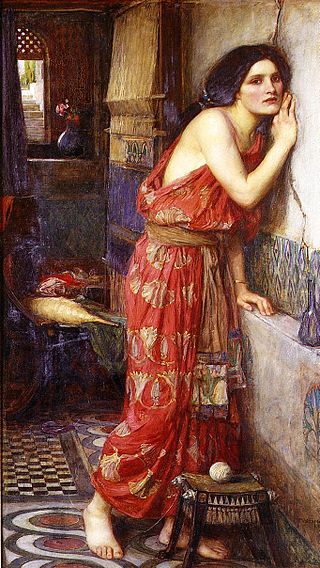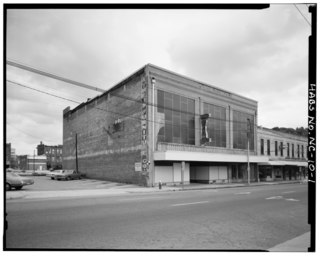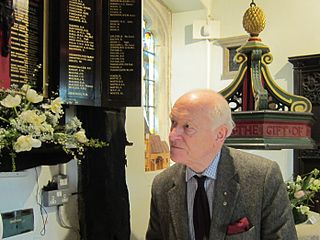Related Research Articles

In Greek mythology, Pyramus and Thisbe are a pair of ill-fated lovers from Babylon, whose story is best known from Ovid's narrative poem Metamorphoses. The tragic myth has been retold by many authors.

The mechanicals are six characters in A Midsummer Night's Dream who perform the play-within-a-play Pyramus and Thisbe. They are a group of amateur and mostly incompetent actors from around Athens, looking to make names for themselves by having their production chosen among several acts as the courtly entertainment for the royal wedding party of Theseus and Hippolyta. The servant-spirit Puck describes them as "rude mechanicals" in Act III, Scene 2 of the play, in reference to their occupations as skilled manual laborers.
Adjudication is the legal process by which an arbiter or judge reviews evidence and argumentation, including legal reasoning set forth by opposing parties or litigants, to come to a decision which determines rights and obligations between the parties involved.

A party wall is a wall shared by two adjoining properties. Typically, the builder lays the wall along a property line dividing two terraced houses, so that one half of the wall's thickness lies on each side. This type of wall is usually structural. Party walls can also be formed by two abutting walls built at different times. The term can be also used to describe a division between separate units within a multi-unit apartment complex. Very often the wall in this case is non-structural but designed to meet established criteria for sound and/or fire protection, i.e. a firewall.
A leasehold valuation tribunal (LVT) was a statutory tribunal in England which determined various types of landlord and tenant dispute involving residential property in the private sector. An LVT consisted of a panel of three; one with a background in property law ; one with a background in property valuation generally a qualified surveyor; and a layman, although some decisions of an LVT were decided by a single member. LVTs were non-departmental public bodies.

The Trade Disputes Act 1906 was an Act of the Parliament of the United Kingdom passed under the Liberal government of Sir Henry Campbell-Bannerman. The Act declared that unions could not be sued for damages incurred during a strike.

An arbitral tribunal or arbitration tribunal, also arbitration commission, arbitration committee or arbitration council is a panel of unbiased adjudicators which is convened and sits to resolve a dispute by way of arbitration. The tribunal may consist of a sole arbitrator, or there may be two or more arbitrators, which might include a chairperson or an umpire. The tribunal usually consists of an odd number of arbitrators. Members selected to serve on an arbitration panel are typically professionals with expertise in both law and in friendly dispute resolution (mediation). Some scholars have suggested that the ideal composition of an arbitration commission should include at least also one professional in the field of the disputed situation, in cases that involve questions of asset or damages valuation for instance an economist.
The Consumer, Trader and Tenancy Tribunal of New South Wales was a tribunal that specialises in resolving consumer disputes in New South Wales, a state of Australia. The tribunal has concurrent jurisdiction in respect of certain consumer claims with the normal civil courts of New South Wales. In other areas of consumer law, it has exclusive jurisdiction. It was created on 25 February 2002 and ceased to function on 31 December 2013, its function assumed by the New South Wales Civil and Administrative Tribunal (NCAT).
The history of fire safety legislation in the United Kingdom formally covers the period from the formation of the United Kingdom of Great Britain and Ireland in 1801 but is founded in the history of such legislation in England and Wales, and Scotland before 1708, and that of the Kingdom of Great Britain from 1707 to 1800.
The Lands Tribunal for Scotland is a tribunal with jurisdiction over land and property in Scotland, relating to title obligations, compulsory purchase and other private rights. The Tribunal was established under the Lands Tribunal Act 1949, which also created the separate Lands Tribunal in England and Wales and Northern Ireland.

A freehold, in common law jurisdictions or Commonwealth countries such as England and Wales, Australia, Canada, Ireland, India and the United States, is the common mode of ownership of real property, or land, and all immovable structures attached to such land.
A fence viewer is a town or city official who administers fence laws by inspecting new fences and settles disputes arising from trespass by livestock that had escaped enclosure.
Alternative dispute resolution (ADR), or external dispute resolution (EDR), typically denotes a wide range of dispute resolution processes and techniques that parties can use to settle disputes with the help of a third party. They are used for disagreeing parties who cannot come to an agreement short of litigation. However, ADR is also increasingly being adopted as a tool to help settle disputes within the court system.

The Party Wall etc. Act 1996 introduced a procedure for resolving disputes between owners of neighbouring properties, arising as a result of one owner's intention to carry out works which would affect the party wall, involve the construction of a party wall or boundary wall at or adjacent the line of junction between the two properties or excavation within certain distances of a neighbour's structure and to a lower depth than its foundations.

The Police Act 1996 is an act of the Parliament of the United Kingdom which defined the current police areas in England and Wales, constituted police authorities for those areas, and set out the relationship between the Home Secretary and the English and Welsh territorial police forces. It replaced the Police and Magistrates' Courts Act 1994, which in turn had replaced the Police Act 1964.

The Copyright Tribunal is a first-instance tribunal in the United Kingdom with jurisdiction over commercial licensing disputes.
The Pyramus and Thisbe Society was founded in 1974 to bring together surveyors and architects with a professional interest in party wall matters, especially related to the Party Wall etc. Act 1996.

Alan Henry Puckridge Gillett, OBE is a chartered surveyor who became Master of the Worshipful Company of Chartered Surveyors. Upon retiring from that occupation in 1995, he became Chairman of the Ealing Hospital NHS Trust and was a visiting professor at Kingston University. He has been active in a variety of other associations and, in 2008, was awarded the Order of the British Empire for his services to the Royal Institution of Chartered Surveyors and the community of Ealing, where he was born and still resides.
Same-sex marriage has been legal in South Georgia and the South Sandwich Islands since 13 March 2014, in accordance with the law in force in England and Wales, although the Foreign and Commonwealth Office only updated its travel advice website page to include a note about it in January 2018. South Georgia and the South Sandwich Islands, despite having no permanent population, was the first British Overseas Territory to recognise same-sex marriage.

The Building Act 1774 was an Act passed in 1774 by the Parliament of Great Britain to consolidate earlier legislation and to regulate the design and construction of new buildings in London. The provisions of the Act regulated the design of new buildings erected in London and elsewhere in Great Britain and Ireland in the late Georgian period.
References
- ↑ Stephen Bickford-Smith and Colin Sydenham Party Walls Law and Practice pp. 79–96, Jordan Publishing Limited, 3rd Edition 2009 ISBN 978-1-84661-179-7
- ↑ "History of the Club". Pyramus and Thisbe Club website. Archived from the original on 14 September 2012. Retrieved 3 February 2012.